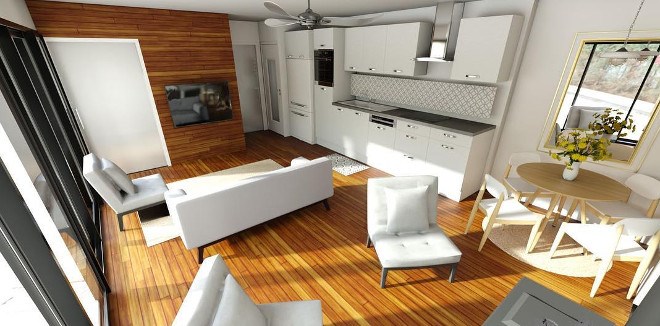Pic Mobert First Nation CEO Norm Jaerhling has seen all kinds of solutions designed to alleviate housing challenges on reserves.
Over the years, the community near the north shore of Lake Superior has been quite innovative in experimenting with various systems, but the basic flaw in the business plan has always the financial risk.
The community is entering into a partnership with SwissCan Co-Development, a Hagersville, Ont.-based joint-venture company that provides affordable housing solutions through some creative financing alternatives that are favourable to First Nation communities.
“We’re structuring our game plan with them right now,” said Jaerhling.
In mid-February, he was working on the mechanics of a deal with the company that could see reconditioned and repurposed shipping containers employed as social housing units in the community.
“What they have is not a unique platform but a unique approach,” he said.
The SwissCan group arranges for private sector financing and manages the placement on the reserve in collaboration with the community.
“The interesting piece with this group is they’ve created a system of private sector financing to fund the costs of the unit, which effectively derisks the use of the housing system for the communities. The only role for the community is to provide the serviced lots,” said Jaerhling.
The company is proceeding this year with a 100-unit development on the Six Nations reserve near Brantford.
“I’ve been out at the site,” said Jaerhling. “It’s ambitious but it’s a really timely solution.
From a manufacturing facility on the Six Nations reserve, near Brantford, the company offers different models of one to three bedrooms and cottages using 40-foot shipping containers.
The interiors offer modern, quality finishes with high-end appliances, plenty of natural light with lights, and in-floor heating controlled by smart systems.
The units are durable enough to withstand temperatures of minus 60 Celsius.
An air circulation system prevents moisture being trapped, which creates mould.
The company even makes an off-grid home powered by Tesla battery systems.
SwissCan has arranged a supply network of partners that include Tesla and Home Hardware, with the shared vision of designing a high-quality, energy-efficient housing system for Indigenous communities, especially geared to those on social assistance allowance.
Rather than design a conventional and expensive wood-framed home that can create a financial hardship for the First Nation, SwissCan went to its supplier network to negotiate certain price points to bring the per-unit cost down without comprising the design and functionality of the unit.
To build a new conventional wood-framed home amounts to $200 to $300 per square foot, a price point that’s unaffordable to the communities and the government. The SwissCan home cost per square foot is about half that.
Jaehrling said the traditional way of constructing homes through the Canada Mortgage and Housing Corp. program is no longer affordable, as their on-reserve housing program doesn’t provide enough money to cover the cost of a home.
First Nation communities are forced to invest large amounts of equity into social housing, thus carrying considerable debt, with the programs based on requirements that no longer work well in collecting minimum rents, he said.
“There are certainly problems with conventional housing, and communities need to find another way of doing this that doesn’t financially cripple them.
“Social housing is real challenge that’s not getting easier.”
While the tiny home movement is thriving worldwide, the idea of living in a shipping container is not universally accepted by all, and is viewed as demeaning by those on assistance.
Jaehrling said he has flagged that stigma as a challenge, but he feels once people see what these units look like and how they perform, the interest will grow.
As a way of introducing this home solution to the market, Pic Mobert is looking at establishing five or six units as transient worker accommodations in nearby White River, where Pic Mobert’s business and economic development subsidiary, White Lake LP, operates a worker camp for Harte Gold.
The entire north shore of Lake Superior is experiencing a housing problem, as mining and forestry companies struggle to attract workers due to the lack of quality and affordable homes.
That accommodation shortage is expecting to grow as workers move into the region this year to begin construction of the East-West Tie transmission project.
Jaehrling said they’re in discussions with an undisclosed company in the area and are close to signing a letter of intent toward bringing a few units northward to put them to the test.
